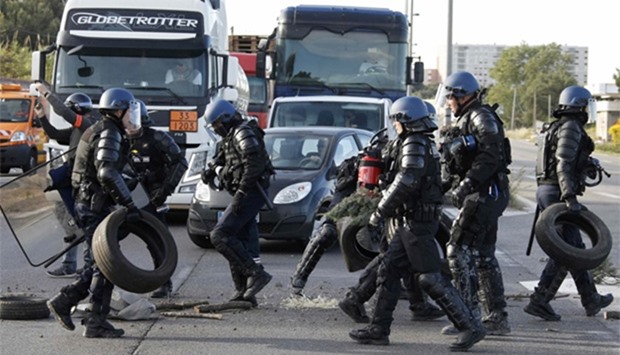Police used tear gas and water cannon to clear a blockade at one major refinery in the south of France where activists from the CGT union were protesting against the Socialist government's labour market reforms.
Six out of eight of the refineries in France have either stopped operating or have reduced output due to strikes and blockades.
With a fifth of service stations either dry or running low on fuel, French President Francois Hollande condemned what he said was the action of a minority of activists.
Hollande and Prime Minister Manuel Valls vowed not to let the activists hold France hostage and to lift the blockade, part of a three-month campaign of strikes against the labour reforms.
Adding to the pressure on the government, hundreds of thousands of football fans are expected to travel to France for the month-long European football championships, which begin on June 10.
Hollande said he could respect legitimate claims from the unions. But that did not mean he could accept a deadlock ‘brought about by a minority’, he told France Culture radio.
Valls called on the CGT union, which is leading the action in protest at labour reforms that it believes are too pro-business, to act responsibly.
‘To take consumers, our economy, our industry hostage in this way -- to continue actions aimed at getting the draft law withdrawn -- is not democratic,’ he added, speaking during an official visit to Israel.
- Police met resistance -
A few hours earlier, riot police moved in at dawn to lift a blockade of the refinery and fuel depots at Fos-sur-Mer, on the Mediterranean coast near Marseille.
The local police authority said officers had met ‘significant resistance’, with objects thrown, and several police and activists had been hurt.
Valls said: ‘We will continue to clear the sites, the depots, which are today blocked by this organisation.’
But CGT secretary general Philippe Martinez remained defiant.
Most people in France opposed the controversial labour reforms that the union was fighting, he told BFMTV, and the prime minister was playing ‘a dangerous game’ trying to set the CGT against the wider population.
Some local authorities in the north and northwest of France have already been forced to impose rationing of petrol supplies.
Motorists in the Paris region who feared running out of petrol resorted to tracking down fuel tankers and following them to petrol stations.
MEDEF, France's employers' organisation, called on the government to ‘re-establish the rule of law’.
In the northeast meanwhile, motorists were driving over the border to stock up at Belgian stations.
Just a few minutes' drive from France, in Hertain, Belgium, a 24-year-old lorry driver, who gave his name as Amazigh, was grateful for the lifeline.
‘Without petrol, we don't work. Here, I filled up for tomorrow and I can go back to Lille,’ the French city just 18 kilometres (11 miles) away.
To add to the government's problems, rail unions are due to strike from Wednesday for two days.
And unions have planned another nationwide day of strikes and demonstrations against the draft law for Thursday.
Some 350 members of the security forces have been injured in demonstrations since March.
Hollande's government says the labour reforms will free up France's rigid labour market, but opponents say it will do little to reduce unemployment which is stuck at around 10 percent.
The government controversially forced the legislation through the National Assembly without a vote earlier this month.
The legislation still faces a vote in the Senate, the upper house of parliament.

